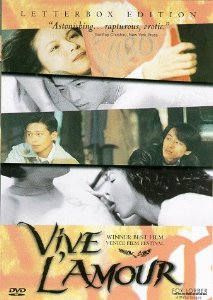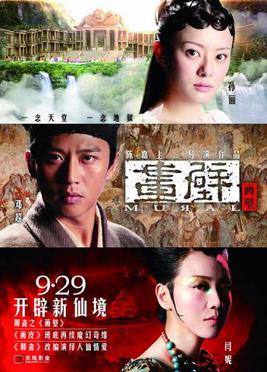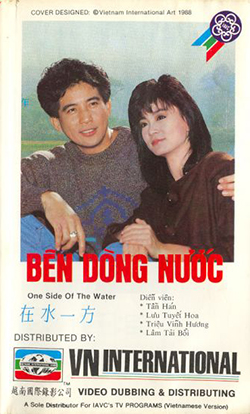Related Research Articles

Vive l'amour is a 1994 Taiwanese New Wave film directed by Tsai Ming-liang. Starring Lee Kang-sheng, Yang Kuei-mei and Chen Chao-jung.

The Hole, also known as The Last Dance, is a 1998 Taiwanese drama-musical film directed by Tsai Ming-liang. It stars Yang Kuei-mei and Lee Kang-sheng.

A City of Sadness is a 1989 Taiwanese historical drama directed by Hou Hsiao-hsien. It tells the story of a family embroiled in the "White Terror" that was wrought on the Taiwanese people by the Kuomintang government (KMT) after their arrival from mainland China in the late 1940s, during which thousands of Taiwanese and recent emigres from the Mainland were rounded up, shot, and/or sent to prison. The film was the first to deal openly with the KMT's authoritarian misdeeds after its 1945 takeover of Taiwan, which had been relinquished following Japan's defeat in World War II, and the first to depict the February 28 Incident of 1947, in which thousands of people were massacred by the KMT.

The Shaolin Temple (少林寺) is a 1982 Chinese–Hong Kong martial arts film directed by Chang Hsin Yen and starring Jet Li in his debut role along with Ding Lan and Yu Hai in supporting roles. The film is based on the Shaolin Monastery in China and depicts Shaolin Kung Fu. The film was among the first major co-productions between Hong Kong and mainland China, and the first to be filmed in mainland China with a mostly mainland cast. The film's plot has an episodic storytelling structure while combining action, comedy and romance elements.

Wu Nien-jen is a Taiwanese screenwriter, director, and writer. He is one of the most prolific and highly regarded scriptwriters in Taiwan and a leading member of the New Taiwanese Cinema, although he has also acted in a number of films. He starred in Edward Yang's 2000 film Yi Yi. Wu is a well-known supporter of the Democratic Progressive Party and has filmed commercials for the party.

Brown Sugar Macchiato is a Taiwanese drama starring members of Taiwanese bands Lollipop F and Hey Girl. It was first broadcast in Taiwan on free-to-air Formosa Television (FTV) from 15 July 2007 to 7 October 2007 and cable TV STAR Chinese Channel. It was also broadcast in China on Xing Kong.

Jam Hsiao Ching-teng is a Taiwanese singer and actor. At the age of 17, while still in high school, he began working as a restaurant singer. In May 2007, Hsiao took part in the first season of China Television (CTV)'s star search show, One Million Star. He signed a contract with Warner Music Taiwan in 2008 and released his debut album, Jam Hsiao, in the same year.
Chen Kun-hou (陳坤厚) is a veteran cinematographer, who started his career in the 1960s. He won his first best cinematography award at Golden Horse Awards in 1978 for He Never Gives Up (汪洋中的一條船), directed by Lee Hsing (李行). In the early 1980s he began to direct his own films in collaboration with Hou Hsiao-hsien (侯孝賢). After series of urban comedies, he made quite a few representative films of the Taiwan New Cinema, such as Growing Up, which won him the best director award at the Golden Horse Awards, His Matramony, which won him the second best cinematography award at Golden Horse Awards, and My Favorite Season, and Osmanthus Alley. He is awarded for his life achievement in Taiwan cinema at the 60th Golden Horse Awards in 2023.
Daughter of the Nile is a 1987 Taiwanese film directed by Hou Hsiao-hsien.

The Return of the Condor Heroes is a Taiwanese television series adapted from Louis Cha's novel of the same name. It was first broadcast on CTV in 1984 in Taiwan.

Mural is a 2011 Chinese film co-written, co-produced and directed by Gordon Chan, which stars Deng Chao, Sun Li, Yan Ni, Collin Chou, Zheng Shuang and Eric Tsang. It is directed by the same director who directed Painted Skin (2008). Both stories are drawn from Pu Songling's (1640–1715) collection of supernatural tales Strange Stories from a Chinese Studio.

The Seven Heroes and Five Gallants is a 1994 Taiwanese television series produced by Chinese Television System (CTS) a few months after its prequel Justice Pao, which was also produced by Chao Ta-shen. Dozens of actors appeared in both series, but only Sze Yu and Tu Man-sheng reprised their roles. Fan Hung-hsuan and Lung Lung chose to portray new characters rather than their iconic roles.
Osmanthus Alley is a 1987 Taiwanese drama film directed by Chen Kunhou. The film was selected as the Taiwanese entry for the Best Foreign Language Film at the 60th Academy Awards, but was not accepted as a nominee.

Back to 1989 is a 2016 Taiwanese fantasy, romance, comedy television series produced by Sanlih E-Television. It is adaptation from Huang Xin Jie's (一念間) who won the 6th Television Scriptwriting Award for creative popularity award held by Bureau of Audiovisual and Music Industry Development. It stars Marcus Chang, Ivy Shao, Mini Tsai, Yorke Sun, Ray Yang and Chang Chieh. Filming began on December 28, 2015, and wrapped up on May 30, 2016. First original broadcast began on January 22, 2016, on SET Metro airing every Friday night at 10:00-11:30 pm.

One Side of the Water is a 1988 Taiwanese television drama series produced by Ping Hsin-tao, based on the 1975 film The Unforgettable Character and its associated 1976 novel, both written by his wife Chiung Yao. The series stars Chiung Yao regulars Chin Han and Leanne Liu in the leading roles.

Lovers Under the Rain is a 1986 Taiwanese television drama series based on Chiung Yao's 1964 romance novel Fire and Rain. Mainly set in 1960s Taipei, the story follows a young girl Lu Yi-ping as she plotted revenge against her father—formerly a warlord in Northeast China who had 9 wives before fleeing the Chinese Communist Revolution for Taiwan—and his entire household, including her kind half-sister Lu Ru-ping.
Fu Yue is a Taiwanese film director.

The World Between Us is a 2019 Taiwanese television series written by Lu Shih Yuan and directed by Lin Chun Yang. The series follows the aftermath of a mass shooting at a movie theatre and the fates of all involved: the killer, the victims, the victims' families, the media, and the legal defense team. Contemporary Taiwanese social issues are explored, such as the death penalty, mental health stigmas, journalism ethics, and media sensationalism.
Lai Cheng-ying born is a Taiwanese cinematographer and film director.

The Spiritual Boxer is a 1975 Mandarin-language Hong Kong martial arts comedy film directed by Lau Kar-leung in his directorial debut.
References
- ↑ 何宝民主编:《中国电影名作欣赏》,海燕出版社, 2007-06-01, ISBN 9787535033819. p.83.
- ↑ 寇立光,李玉芝:《台湾香港电影名片欣赏》,山西教育出版社,1993, ISBN 7-5440-0257-8. p.75.